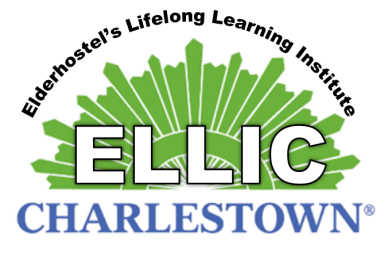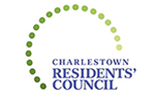Last Updated on October 8, 2021
A Brief 10-Year History of ELLIC

About 30 people came to the original meeting and showed interest. Following the formal meeting, a small number gathered at the front of the auditorium to express further interest in the program. This group included Carolyn Denton, Charles Denton, Peggy Wixted, Joe Wixted, Charlotte Valentine, Nancy Clark, Shirley Parker, Lauralee Whitmore, and Ralph Strong. Since sufficient interest was shown, a second meeting was set up a few weeks later, and the organizational guidelines were outlined by Melissa Wyse.
Following the second meeting, the interested residents noted above became the committee leaders. They wrote a simple set of bylaws defining the core committee, specified dues, and generally defined core-committee members’ activities. The bylaws were deliberately kept simple and flexible. Some early considerations were:
1. Select the name, Elderhostel’s Lifelong Learning Institute at Charlestown (ELLIC).
2. Develop the logo.
3. Set the dues at $25.
4. Establish a structure for the core committee and select the initial officers.
5. Request and obtain approval from Elderhostel to use their name and logo.
The committee leaders for the first year were:
Ralph Strong Committee Moderator
Peggy Wixted & Nancy Clark Curriculum Co-Chairs
Carolyn Denton & Lauralee Whitmore Communications
Charlotte Valentine & Shirley Parker Membership
Joe Wixted Finance
Charles Denton At Large
Ralph Strong Catalog
A budget was created which included paying for printing costs with the assumption that about 100 people would join. One surprise came when we found that we had about 300 members in the first year.
We advertised for resident and staff members to develop courses and in the first year obtained about 50 volunteers who would teach. Peggy Wixted was our best recruiter. As we enrolled about three times as many members as we expected and found that Charlestown would provide printing for us, we had excess funds. After some deliberation, we decided that those funds should be used to bring outside lecturers into the program, so we developed “Special Programs” in addition to the resident and staff programs. This has proven to be a significant slice of the ELLIC activity.
Two catalogs were released during the first year, one in September and a supplement in January. The program was well received. An annual meeting was held in June 2009 with the expectation that members would participate and wish to be involved in selecting leaders. To entice attendance, we hired an entertaining performer. While the meeting was well attended, there was no interest from the membership to be involved with the core committee organization. However, the annual meeting proved popular and has been continued as a beneficial means for promoting ELLIC.
After three years, Ralph Strong resigned as moderator based on the theory that the activity will be sustainable only if new leadership is introduced every few years. Peggy Wixted then accepted the position and performed duties as moderator for the next three years. Charlotte Valentine held the position for about a year, but it reverted back to Peggy Wixted until the reins were taken by Gif Intlekofer in 2014.
The committee has grown in number and the organization has evolved. The current chairs are for Moderator, Recording Secretary, Corresponding Secretary, Treasurer, Catalog, Communications, Curriculum, Membership, Registration, Technical Support, and Auditorium Support. Membership has grown to over 400 resident members, and over 100 classes are offered.
Many had initial concern that the program would conflict with the Catonsville Community College offerings at Charlestown. Experience has shown that the two programs are sufficiently different so that the competition has not harmed either and may even have been beneficial, as more diverse offerings have been introduced as a result of this competition.
About a year after the ELLIC program was initiated, we were visited by a representative of Elderhostel Discovery programs. He proposed a one-day Discovery program at Charlestown for area residents. Elderhostel would provide the publicity and all programming, while Charlestown would provide the facility, lunch, and support services. At the time, the committee determined that there was some financial risk and that the program would result in more pressure than we wished to take on, so we decided against sponsoring it. A motive of Elderhostel (now known as Roads Scholar) in promoting lifelong-learning organizations at senior communities was to promote sales opportunities for these one-day Discovery programs. While Charlestown certainly has the facilities to co-sponsor such an event, and it would have some potential to enhance Charlestown’s image, we have not studied the issue further. The Roads Scholar organization has not asked for any fees, donations or other requirement in return for the use of its name. They have offered advice and suggested general guidelines.
While ELLIC differs substantially from university programs from which it was modeled, it serves the needs of Charlestown very well. It provides residents who have passions for a variety of subjects and an opportunity to share their passion, ideas and expertise. This in turn gives residents enrichment in education and entertainment with mutual benefits. The scale of ELLIC at Charlestown exceeded our expectations and has become an important highlight in the diverse activities offered at Charlestown.
The ELLIC Steering Committee now includes 20 residents and also involves many more in sub-committees who help with curriculum, technical services, membership, and other functions. Course registration fills over 4,000 classroom seats in our community, and we bring about 30 outside speakers annually to the community to enrich the curriculum.
Prepared by Ralph Strong
September 2017
…….
